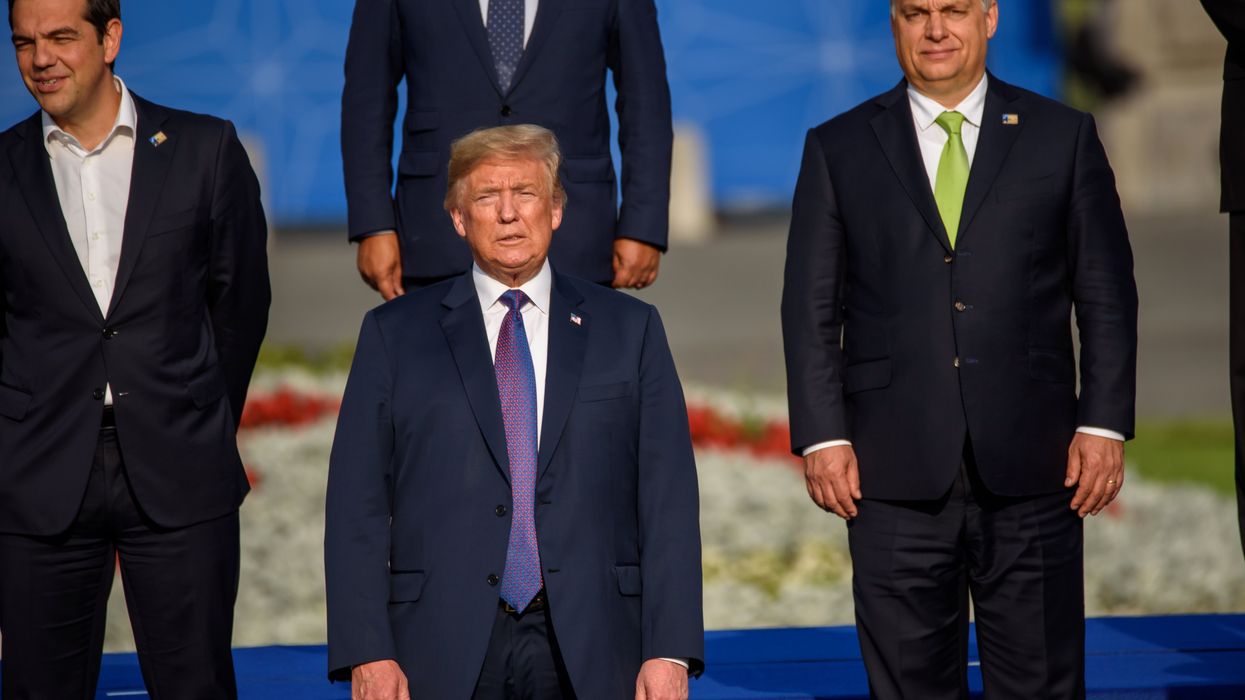Reporter victimized by notorious strongman cites 'ominous signs' with Trump

U.S. President Donald Trump with Hungarian Prime Minister Viktor Orban in Brussels, Belgium in 2018 (Gints Ivuskans/ Shutterstock.com)
March 15, 2025 | 12:40PM ETWorld
During a Friday, March 14 speech at the U.S. Department of Justice (DOJ), President Donald Trump angrily railed against CNN and MSNBC and suggested that criticism of him on those cable news outlets should be outlawed.
Trump told attendees, "I believe that CNN and MS-DNC, who literally write 97.6 percent bad about me, are political arms of the Democrat Party. And in my opinion, they're really corrupt, and they’re illegal. What do they do is illegal…. These networks and these newspapers are really no different than a highly paid political operative. And it has to stop, it has to be illegal…. I don't believe it’s legal, and they do it in total coordination with each other."
Trump's comments are drawing condemnation not only in the United States, but also, in Europe. In an article published by The Atlantic on March 15, Hungarian journalist Andras Petho warns that Trump's attacks on the media must not be taken lightly. And he makes his point by describing far-right Hungarian Prime Minister Viktor Orban's crackdown on press freedom.
READ MORE: 'Down nearly 40 percent': Musk’s far-right MAGA politics are sinking Tesla
"As a Hungarian investigative journalist," Petho argues, "I have had a firsthand view of how Orban has built his own media universe while simultaneously placing a stranglehold on the independent press. As I watch from afar what's happening to the free press in the United States during the first weeks of Trump's second presidency — the verbal bullying, the legal harassment, the buckling by media owners in the face of threats — it all looks very familiar. The MAGA authorities have learned Orban's lessons well."
In 1990, Hungary went from being a one-party communist dictatorship to being a liberal democracy that held free elections. But Orban, not unlike President Recep Tayyip Erdogan in Turkey, did everything he could to undermine Hungary's system of checks and balances after becoming prime minister again in 2010. And Orban went after the Hungarian press with a vengeance.
"One of the first pieces of legislation his party introduced was a media law that restructured how the sector is regulated in Hungary," Petho recalls. "The government set up a new oversight agency and appointed hardline loyalists to its key positions. This agency later blocked proposed mergers and acquisitions by independent media companies, while issuing friendly rulings for pro-government businesses. The Orban government also transformed public broadcasting — which had previously carried news programs challenging politicians from all parties — into a mouthpiece of the state."
Petho continues, "The service's newly appointed leaders got rid of principled journalists and replaced them with governing-party sympathizers who could be counted on to toe the line. Then, the government went after private media companies."
READ MORE: 'Sounds like Putin': Trump blasted for declaring top news organizations 'illegal'
The Hungarian journalist notes that in his country, "editors and reporters get directions from the very top of the regime on what they can and cannot cover." And he sees some "ominous signs" for American journalists during Trump's second presidency.
"When I read about the Associated Press being banned from White House events," Petho warns, "that reminds me of how my colleagues at Direkt36 have been denied entry to Orban’s rare press conferences. When I see the Washington Post owner Jeff Bezos cozying up to Trump, that reminds me of how big corporations and their wealthy executives, including the owner of my former workplace, bent the knee to Orban. When I read about ABC settling a Trump lawsuit of dubious merit — and CBS contemplating the same — it brings to mind the way the courts and the government itself can be used to manipulate and bully media organizations into submission."
Petho adds, "Journalists and anyone else who cares about the free press must understand that democratic institutions are more fragile than they look, especially if they face pressure from ruthless and powerful political forces."
READ MORE: 'Little to no decision making': Here's who's actually running DOGE
Andras Petho's full article for The Atlantic is available at this link (subscription required).